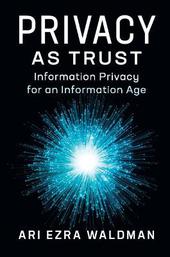
|
Privacy as Trust: Information Privacy for an Information Age
Paperback / softback
Main Details
| Title |
Privacy as Trust: Information Privacy for an Information Age
|
| Authors and Contributors |
By (author) Ari Ezra Waldman
|
| Physical Properties |
| Format:Paperback / softback | | Pages:216 | | Dimensions(mm): Height 228,Width 153 |
|
| ISBN/Barcode |
9781316636947
|
| Classifications | Dewey:323.448 |
|---|
| Audience | | Professional & Vocational | |
|---|
| Illustrations |
Worked examples or Exercises
|
|
Publishing Details |
| Publisher |
Cambridge University Press
|
| Imprint |
Cambridge University Press
|
| Publication Date |
29 March 2018 |
| Publication Country |
United Kingdom
|
Description
It seems like there is no such thing as privacy anymore. But the truth is that privacy is in danger only because we think about it in narrow, limited, and outdated ways. In this transformative work, Ari Ezra Waldman, leveraging the notion that we share information with others in contexts of trust, offers a roadmap for data privacy that will better protect our information in a digitized world. With case studies involving websites, online harassment, intellectual property, and social robots, Waldman shows how 'privacy as trust' can be applied in the most challenging real-world contexts to make privacy work for all of us. This book should be read by anyone concerned with reshaping the theory and practice of privacy in the modern world.
Author Biography
Ari Ezra Waldman is Professor of Law and Director of the Innovation Center for Law and Technology at New York Law School. He is a widely published and internationally sought-after scholar of data privacy, online social life, and cyber harassment. He founded the first and, to-date, only law school clinic that provides free counsel to victims of cyber harassment. His scholarship on privacy and trust won the Otto L. Walter Distinguished Writing Award in 2016. Professor Waldman also won the Best Paper Award, sponsored by the International Association of Privacy Professionals, at the 2017 Privacy Law Scholars Conference. He earned an A.B., magna cum laude, from Harvard College; a J.D. from Harvard Law School; and a Ph.D. in sociology from Columbia University.
Reviews'This book is a concise look at the philosophy of and theory behind privacy. Waldman ... blends philosophy, sociology, and legal theory to explore where Americans stand with privacy and how to shape privacy law going forward. Different perspectives and theories are introduced and explained without being overwhelming or too nuanced. Classical philosophers and modern privacy experts are cited side by side. This is a great text for a graduate seminar as it provides many conversation topics and viewpoints. A quarter of the book contains extensive endnotes and further sources for exploration.' J. M. Keller-Aschenbach, Choice 'In Privacy as Trust, Ari Ezra Waldman charts one of the most important modern accounts of privacy. This insightful, thorough, and elegantly written book lays the foundation for a better digital world based upon trust in others. A must-read for anyone who cares about the way we talk about and make rules for privacy.' Woodrow Hartzog, Northeastern University, Boston 'There is, at present, a great deal of sophisticated sociological work on individual expectations of privacy, and a parallel literature by legal academics which explores the limits and possibilities of data protection policy. Ari Ezra Waldman's brings together these two literatures with a strikingly original synthesis of what social science should mean for law, and how legal disputes can inform the research agenda of sociologists, computer science researchers, and corporate privacy professionals, while also offering a vision for the future of data protection policy via deep engagement with case studies of quintessential privacy violations. This work should inform data governance globally, thanks both to its substantive recommendations, and its model method for addressing emerging privacy concerns. A profoundly important book.' Frank Pasquale, University of Maryland 'Privacy as Trust helps us escape zero-sum notions of privacy as all or nothing. And it grounds the often theoretical discussions about privacy's value in everyday examples, charting a path forward for privacy as an integral component of our personal relationships. This book is a must read for anyone interested in saving privacy in the digital age.' Scott Skinner-Thompson, University of Colorado, Boulder
|